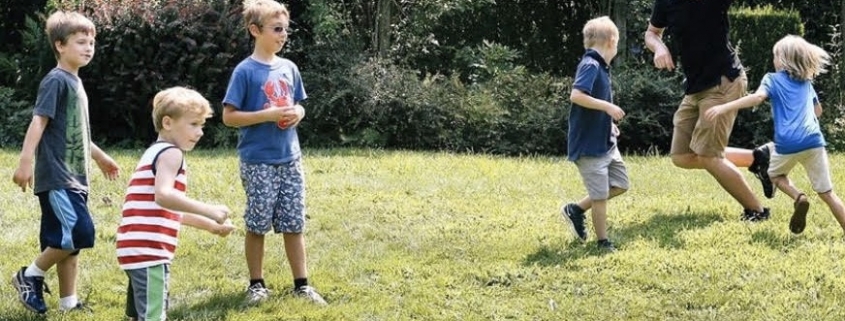How To Cultivate Good Sportsmanship
It can be difficult to witness a sore loser in full throttle. The strange sounds coming out of your child and flailing appendages instinctively makes you want to wrap protective arms around the little body gone haywire, with a kiss on the head and a promise that everything will be alright. Despite your outward projection of confidence, inwardly you know your child couldn’t be feeling further from “alright.” Soon you hear your child rattling off disturbing performance assessments like “I can’t do anything right” or “I’m stupid” or “I never win!”
It’s only natural to wonder: is your child destined to a lifetime of focusing on unattainable goals and emotional burnout? Or is there something you can do to calm the storm and help your child develop better sportsmanship?
The Consequences of Raising a Sore Loser Can Be Traumatizing
It may be tempting to let your child win all the time or quit a sport in response to the histrionics. However, it’s worth tackling head-on, given the lasting repercussions. For instance, Canadian researchers found that sore losers tend to be perfectionists who put incredible levels of unhealthy pressure on themselves and see no other options but to win.
Flying off the handle once or twice isn’t likely to cause long-term harm, but a continual pattern of hysterics can result in depression, cardiovascular disease, and (perhaps worst of all) social ostracization.
When it comes to sore losers, “Pardon one offense, and you encourage the commission of many.” Do not turn a blind eye. Consider this your child’s cry for help in dealing with big emotions. It will happen – not overnight, but certainly with your care and compassion.
What Happens in the Brain When a Child Loses
Neuroscientist Maarten van Boksem assessed brain activity using MRI and EEG while subjects played games. He found that losing a game triggered the same brain activity as banging one’s head against a door at full speed. The anterior cingulate cortex lit up in response to the stress; this is the same part of the brain involved in reward anticipation, identifying errors — and, consequently, decision-making. So it’s perfectly understandable your child may not make the best behavioral decisions fresh off a loss. As babies, we understand that we fall and pick ourselves back up again as part of the learning process. As adults, we figure out how to make better decisions to avoid defeats.
Many factors influence how your child will respond to a loss:
- Genetics – To some extent, your response to a loss is hardwired into your character depending on how sensitive you are and how well you can control your emotions.
- Status – Primate research shows us that the strongest alpha male and members at the very bottom of the hierarchy display the lowest stress response to defeat. In other words, they are assured of their social position. The animals in the middle – who had the most to win or lose – tended to see much higher cortisol spikes.
- Maturity – Children who are just a year old understand something isn’t right when a handful of sweets are divided unequally among two dolls. By age five, a child is much better able to independently dial down on the biological fight-or-flight response. Maturity is largely a social process. Through gentle correction, you can influence this factor.
What You Can Do As A Parent To Cultivate Good Sportsmanship and Graceful Losing
- Express empathy and empower. Emotions are not “good” or “bad”; they are comfortable and uncomfortable. You might say, “It can be really uncomfortable to lose. You’re really disappointed now, aren’t you? We can’t help that feeling. It’s natural. But we can choose what we do next.” Your child might start by taking a deep, centering breath.
- Choose the right words. You want to avoid praising your child’s intelligence or good looks; instead, focus on innate qualities your child can control. Praise effort, patience, resilience. If your child complains, “I always lose” – you can say, “You haven’t won today — YET.” If your child says, “I suck at this game” – you can rephrase, “You just haven’t mastered the skills YET.” Consider some of the growth mindset books out there to help reinforce the concept that we are always in a state of becoming.
- Find the silver lining and praise that. “I really liked how you anticipated that guy’s move and blocked him. It shows you’re thinking ahead,” you might say. If your child tries a new sport and immediately wants to quit, you might say, “You didn’t care for baseball, that’s too bad. It was good that you tried something new. Life is all about trying new things to see what we like.”
- Pick a favorite quote or mantra and repeat ad nauseum. Repeating a mantra can eventually sink in – like “Some days it’s our turn to win, and some days it’s our turn to lose. That’s just how life is.” Or, on a more positive note, you might say, “As long as you have fun, you always win.” Gently remind your child (and some days yourself): “We can only do our best! As long as you do your best, you are always a winner.” It may seem futile at first, but eventually you will catch your child repeating your same old sayings.
- Allow natural consequences. If your child throws an epic fit after a loss, calmly say, “That’s not how we act. We’ll put the pieces back in the box and try again another day.” The next time your child asks to play, you might say, “I can’t play with you if you’re going to scream and yell if you don’t win the game. Do you promise me you’ll take a deep breath instead?”
- Play cooperative games. Some small fries are not mature or ready enough to play competitive games. Try cooperative games like “Outfoxed,” “Forbidden Island,” “Hoot Owl Hoot,” “Search and Rescue,” or “Shadows in the Forest” in the meantime. There are no winners and losers in dance parties, swimming, horseback riding, canoeing, or yoga.
- Remind that life is about the journey, not the end. Instead of asking about your children’s grades or whether they won or lost a sporting event, ask whether they had fun, what they learned, or whether they did their best. Remind your child of the skills you’re acquiring in the process or provide positive feedback about a particular good decision your child made. “You’re starting to think ahead,” you might say during chess; or “your footwork is really coming along,” you might say after a soccer game.
- Soften the blow. As you are playing a game with your child, remark about how fun certain aspects of the game are. You might mention, “Oh no, you nearly had me there!” or “Thanks for making this game so challenging for me!” Emphasize effort over result by saying, “You really put a lot of effort into that.”
- Take the pain out of losing. This works particularly well when you’re playing with multiple children. You can make a rule where the winner cleans up the game, so the losers don’t feel so bad. Or the loser can choose the next game.
- Model good sportsmanship yourself. Avoid blaming, shouting, or trash talking. Do not allow winners to gloat or poor sports to bend the rules. After a game, whether you win or lose, shake your child’s hand and say, “Good game.” While watching professional sports on television, wait it out until the very end and point out to your child how the basketball, hockey, baseball, soccer, or football players always line up to express positive wishes to their opponents. You can say something like, “I’m sad our team lost today. But it’s okay to feel disappointed. I know I will feel better soon and we can always try again.”
- Or model poor sportsmanship. We’re not recommending that you launch a temper tantrum after picking the candy hearts at the end of Candyland. However, you could say something like “I feel so bad about losing! I’m so frustrated! I’m really angry! What can I do to feel better?” This sort of discussion can spark empathy in your child and you may be surprised with the thoughtful ideas they have.
- Focus on anger management. Developing anger management skills can be a lifelong process, but it’s best to nip aggressive reactions in the bud while your child is young. What can be expected for a three-year-old is simply intolerable for a 12-year-old. Understanding choices to cope with big emotions is imperative and there are many books to help guide you. Emphasize labeling the feeling and then determine a strategy to deal with it. Many children find it helpful to take deep breaths or take a short walk away from the table.
- Reward the hard choice. Some children respond really well to therapist-recommended positive reinforcement systems. Let your child know that losing can be hard, but every time your child loses gracefully with a “good game,” rather than a tantrum, a point will be earned. At 10 points, a desirable reward can be selected from a jar of options – a dinner out, a movie, playing catch with dad, an ice cream cone, an afternoon at Chuck E. Cheese, or a sleepover with friends.
At Shine, every child is a winner. Our educators teach compassion through fun, engaging classes based on science, art, imagination, music, and culture. In addition to enrichment activities, we also offer family coaching. Contact us for details.



